Where 22 young mothers share dreams bigger than their struggles

Two of the teenage mothers housed at a shelter in Dagoretti, Nairobi during an interview on June 5, 2025. These young women though balancing on the precipice between girlhood and motherhood are determined to rewrite their narratives.
What you need to know:
- Three teen mothers in Nairobi—aged 14 to 16—are transforming their lives after surviving sexual abuse.
- Christabel dreams of becoming a judge to ensure justice for other victims, Monicah has found strength after abandonment, and Grace has returned to school whilst raising her baby.
- Despite facing defilement, rejection, and poverty, these young women are rewriting their narratives—from victims to survivors to advocates for change.
The midday sun beats down mercilessly as we approach the gates of this sanctuary in Dagoretti, Nairobi County. It's exactly noon when a young boy appears, his face breaking into a smile so genuine it seems to illuminate the dusty courtyard beyond.
"Karibuni huku sana," he says, his voice carrying the warmth of genuine welcome as he gestures us through the entrance.
What greets us stops us in our tracks—not with shock, but with unexpected tenderness. Across the yard, washing lines dance in the breeze, heavy with tiny clothes that tell a thousand stories: miniature rompers in sunshine yellow, baby socks no bigger than a thumb, bibs splashed with every colour imaginable. Each piece of clothing represents a life—young mothers piecing together futures from fragments of hope.
"This is where we stay," says Ivy Muriithi, True Care Newday Centre's founder, extending a firm handshake that speaks of quiet strength. "It's both our home and a rescue centre for teen mothers."
Her voice carries the calm authority of someone who has walked through fire and emerged with purpose. As she guides us deeper into the facility, each door she opens reveals another layer of this intimate world where childhood collides with motherhood, where trauma transforms into resilience.
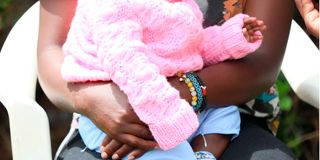
Silvia, a teenage mother, holds her child at Truecare Newday Centre in Dagoretti, Nairobi, on June 6, 2025.
In a small room lined with double-decker beds, we encounter our first glimpse of this complex reality. A 14-year-old girl lies quietly, her new-born—just five days old—nestled beside her in peaceful slumber. Her face holds the softness of youth, but her eyes carry depths that speak of experiences no child should endure.
"Salimia mgeni," Ivy encourages gently, and the young mother's handshake is tentative but warm—a bridge between her childhood and this new identity thrust upon her.
The statistics paint a sobering picture: according to the Kenya National Bureau of Statistics, the country recorded 110,821 pregnancies among adolescents aged 10 to 19 in just the first five months of 2023 alone. Data from the African Population and Health Research Centre reveals over 100,000 adolescent mothers aged 15-19, with Samburu County leading at a staggering 50 per cent.
But statistics cannot capture what we witness in the sitting room—the heart of this makeshift home where survival meets hope daily.
Also read: Giving hope to desperate teen mothers
The sitting room hums with life in ways that defy its modest surroundings. Young mothers sit shoulder to shoulder, some balancing infants on their laps, others breastfeeding with the unselfconscious grace of those who've grown up fast. A few with rounded bellies shift carefully in plastic chairs, their hands instinctively protective over the lives growing within.
Laughter punctuates conversations as babies gurgle and squirm, their innocence a striking contrast to the struggles their mothers silently carry. This is more than a rescue centre—it's a living tapestry of survival, resilience, and fragile hope woven together by shared experience.
"Let's start with introductions," Ivy announces, her voice cutting through the gentle chaos with calm authority.
One by one, they stand—these young women balancing on the precipice between girlhood and motherhood. Their voices are steady as they share names and brief stories, some proudly holding up babies whose faces glow despite the trials that brought them here.
From victim to advocate
Christabel, 16, cradles her son with the fierce protectiveness of someone who knows what it means to fight for safety. At a year and a half, her boy radiates the joy that only children possess, seemingly unaware that his existence sparked his mother's transformation from victim to survivor.
"I am a mother to a beautiful son who is now a year and a half old. Today, I want to share my story—where I've come from, where I am now, and how I've turned my pain into strength to inspire others.
I was defiled and abused by my father, an experience that could have shattered me completely. But instead of letting it break me, I chose to rise above it. My journey has taught me that sometimes, the hardest struggles can lead to new beginnings.
To become strong, you must endure challenges. To grow, you must face heartbreak and adversity. That's what I've learnt. My past gave me my son—a handsome, joyful little boy who is the light of my life and my source of strength. Whenever I look at him, I feel empowered. He gives me a purpose: to work hard, to build a better future, and to ensure he never goes through what I went through.
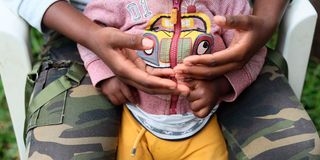
Christabel, a teenage mother, holds her child during an interview at Truecare Newday Centre in Dagoretti, Nairobi, on June 6, 2025.
When I was pregnant, I felt hopeless. I couldn't imagine how my life would ever improve. But then, I found Shofco Group, and everything changed. I reached out to them, shared my story, and they asked me a simple yet life-changing question: 'Are you ready to go back to school?' I said yes, and that was how I came to be here.
Now, I am in Grade Seven—something I never thought I'd achieve. Every day, I am grateful for the opportunity to learn and grow. I have big dreams: I want to become a judge. My goal is to ensure that no one else endures what I went through without justice or support.
You see, the father of my child is a policeman, and because of his position, he was protected. Justice was denied to me, and that is something I don't want other girls to experience. I want to stand up for the voiceless, to ensure they are heard and protected.
Life is not easy, but it is beautiful. To any girl who has been defiled, raped, or feels like life is too hard to go on—don't give up. Be strong. You are more than your pain, and your future is brighter than you can imagine.
Today, I am not just a survivor; I am a mentor. I counsel my peers, both in and out of school. I share my story to show others that healing and empowerment are possible. With the love and support of the people around me—my mentors, my 'mum' and 'dad' at the rescue centre, and my friends—I've found strength I never knew I had.
My past will not define me, but it has shaped my purpose. My son is my reason to smile, and my dream of becoming a judge is my motivation to keep going.
To anyone out there struggling, remember this: your pain can become your power. You can rise above anything, just as I have."
When promises turn to ash
Monicah, 16, holds her three-month-old daughter close as she shares her journey from deception to empowerment. Her voice carries the quiet strength of someone who has learned to stand on her own feet.
"I come from Limuru, a small town where life hasn't always been kind. My baby, who is about to turn three months, is my greatest joy. I love her deeply, even though the journey to where I am now has been far from easy.
Growing up, my family struggled with poverty. There were days we went without food, and paying school fees was out of the question. I was in Form One in 2024, when I met a boda boda rider who seemed like an answer to my prayers. He promised to take care of me and provide for my needs. True to his word, he bought me clothes, a phone, and food. For the first time, I felt loved and valued.
Our friendship grew, and before I realised it, I was pregnant. It happened around June. When I discovered I was expecting, I went to him for support, but he outright denied responsibility. Just like that, he disappeared from my life.
From that moment, everything fell apart. My father, furious and disappointed, chased my mother and me away from home. With nowhere to turn, we relied on the kindness of well-wishers who offered us a place to stay. It was a bare space—no mattress, no essentials—just walls and a roof. Every day was a struggle, and the weight of my pregnancy, combined with the uncertainty of our future, left me overwhelmed and stressed.
My mother, determined to find a solution, spent countless hours searching for help. One day, whilst browsing, she came across a rescue centre for teen mothers. That discovery changed everything.
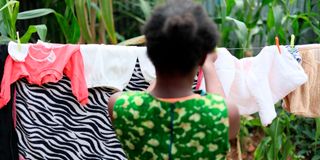
Monicah, a teen mother, hangs her child's clothes at TrueCare Newday Centre in Dagoretti, Nairobi, on June 6, 2025.
Since arriving here, my life has transformed. For the first time in a long while, I feel loved and supported. I've found a community of people who care, and I've learnt to stand on my own two feet. The centre provides everything we need—food, shelter, and, most importantly, emotional support. We share our stories, laugh together, and lean on each other in moments of doubt.
We attend church regularly, which has been a source of comfort and hope for me. The counselling sessions here have been a lifeline, helping me heal from the pain of the past and find strength to move forward.
I'm now empowered, confident, and ready to face life head-on. My baby is my motivation, and I'm determined to give her the love and care she deserves. Once she's a bit older, I plan to join a vocational training centre to acquire skills that will help us build a better future.
Through this journey, I've realised the power of resilience and the importance of support. Today, I'm able to counsel other young girls who are going through similar challenges. My message to them is simple: no matter how dark life seems, there's always hope. With the right support and determination, you can rise again."
Grace's awakening
Grace, now in Grade 9, speaks with the measured cadence of someone who has travelled from the deepest darkness into light. At 16, with her four-month-old son who will turn five months on 21st June, she embodies the possibility of transformation.
"Sharing my story is deeply emotional, but I'm grateful to be able to speak about it now without breaking down. I was raped, and that painful experience is the reason I am here today with my child. Whilst it was a harrowing journey, I thank God that I can now find strength in my story and use it to inspire others.
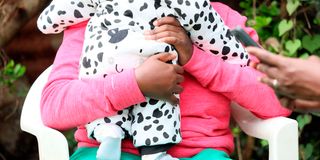
Grace, a teenage mother, holds her child during an interview at Truecare Newday Centre in Dagoretti, Nairobi, on June 6, 2025.
Whenever I sit with other girls here and we share our experiences, I realise how far I've come. Hearing their stories reminds me to be grateful for my progress. I am 16 years old, and my baby boy is four months old—he will turn five months on 21st June. He is my pride and joy, and every time I look at him, I find the strength to keep moving forward.
I come from Kawangware, but this centre has become my home. It's not just a place to stay; it's where I found hope, love, and the courage to rebuild my life. When I first discovered I was pregnant, I felt lost and overwhelmed. I even considered abandoning my child because I didn't think I could handle being a mother. But the mentor here believed in me when I couldn't believe in myself. She encouraged me to see my baby as a blessing, not a burden, and her support transformed my mind-set.
Today, I love and appreciate everything about my baby boy. He has brought so much joy into my life, and I am determined to give him the love and care he deserves. Being his mother has taught me strength and resilience.
I've also reclaimed my life in other ways. I have gone back to school and am now in Grade 9—a milestone I once thought was impossible. This opportunity fills me with so much happiness. I've left behind the distractions and mistakes of my past. Mambo ya vijana nimewacha mbali (I don't want anything to do with boys for now).
Now, I focus on empowering other young mothers. I share my story with them and encourage them to see their children as gifts, not obstacles. You never know what the future holds—our children could become the hope we need tomorrow.
To any teen mother out there: love your child, cherish them, and find strength in your journey. Life may not be easy, but it is full of possibilities. Our children give us a reason to rise above our struggles and create a brighter future for ourselves and for them."
Woman behind the sanctuary
Ivy Muriithi's story begins in violence and transforms into purpose—a journey that explains why she opens her doors to these young mothers with such fierce dedication. Founded in 2021, True Care Newday Centre is the physical manifestation of her commitment to ensuring no girl faces alone what she once endured.
Growing up in Kirinyaga, violence was the soundtrack of her childhood. At just 12 years old, she survived an attempted rape by her stepfather—an experience that would later shape her understanding of trauma and the long road to healing.
"My mother fled with me to Nairobi, where I worked as a house help in Lavington," Ivy recounts. "My employer, noticing my potential, empowered me by sending me back to school."

Truecare Newday Centre founder Ivy Muriithi during an interview in Dagoretti, Nairobi, on June 6, 2025. She says most teen mothers face identity crises, low self-esteem, and challenges like balancing school and childcare.
Education became her pathway to transformation. "I completed my education at Jomo Kenyatta University of Agriculture and Technology, earning a degree in IT. Later, I started my own ICT business, which now funds the centre."
The business success was never an end in itself—it was always meant to serve a greater purpose. "My journey taught me the importance of lifting others, just as I was lifted."
Today, the centre houses 22 girls and 16 babies, with six of the new-borns under two months old. But these numbers barely capture the scope of care provided—prenatal and antenatal support, counselling, education assistance, and vocational training opportunities like hairdressing.
"These girls come to us broken, but we work to rebuild them emotionally and mentally," Ivy explains. "Once they are stable, we help them return to school or pursue vocational training so they can regain control of their future."
The centre collaborates closely with police and children's departments to ensure cases are genuine and that proper support is provided. But beyond official partnerships, Ivy has made a personal commitment that speaks to her character.
"I live at the centre with my family, sharing my home and resources," she says. "I'm a mother to many children. My doors are always open because I believe in giving these girls a second chance."
Her message to young girls everywhere carries the urgency of someone who knows how quickly silence can become complicity: "Many cases start with small incidents that escalate because the girls are too afraid or ashamed to speak. Don't stay silent. There is always help, and no one should face these challenges alone."
The psychology of healing
Teresia Watetu, the centre's shelter manager and counselling psychologist, provides crucial insight into the complex challenges these young mothers face. Working with survivors of gender-based violence(GBV), child labour, and trafficking, she understands that teen motherhood often results from defilement—a form of GBV addressed by laws like the Children's Act 2022.
"Most of them face identity crises, low self-esteem, and challenges like balancing school and childcare," she explains. The psychological burden extends beyond the immediate trauma. "Many also struggle to accept motherhood, often rejecting pregnancies or seeking adoption due to the trauma of abuse."
The consequences of leaving these girls unrescued are severe. "Unrescued girls risk developing health issues, addiction to sex, and self-blame due to prolonged abuse, often occurring within family settings," Teresia reveals.
Even with intervention, the road to recovery is long and complex. "Reintegration into school is fraught with stigma and challenges, as many struggle with parenting alongside their education. Recovery and adjustment are long processes, often taking months or years, requiring intensive counselling and sustained support."
The bigger picture
Anthony Ajayi, a research scientist at the African Population and Health Research Centre and co-lead on adolescent sexual and reproductive health, places these individual stories within a broader context of prevention and policy.
"These girls are just not ready to be mothers," he states with stark clarity. "They are children themselves and need care. It's essential to educate young people about sexual health, and this responsibility lies with parents, elders, church leaders, and the government."
The timing of education is critical. "Most young people initiate sex around age 16, meaning they need to learn about contraception even earlier—at ages 13 or 14," Ajayi explains. "They must also understand what to do if they are forced or raped, including seeking emergency contraception and testing for HIV."
Despite cultural stigma around sexual health discussions, he insists on comprehensive education. "When young people know their options, they are empowered to make informed decisions. Contrary to popular belief, having this information doesn't encourage them to engage in sex—it helps them abstain or take precautions when necessary."
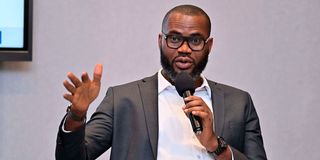
Anthony Ajayi, a research scientist at the African Population and Health Research Centre. He says it is important to educate young people about sexual health, and this responsibility lies with parents, elders, church leaders, and the state.
The role of community cannot be overstated. "Our research shows that many young girls get pregnant because they lack supervision. Parents are often working long hours for little pay, leaving children vulnerable to exploitation. Elders and community leaders need to step up and mentor these young people."
Economic factors also play a crucial role. "Teen pregnancies are more prevalent in impoverished communities," Ajayi observes. "Improving the economy can help reduce vulnerability. It's rare to see these issues in wealthier areas. Investing in education and economic growth is essential for breaking the cycle of poverty and early motherhood."
There is reason for cautious optimism. Ajayi commends Kenya's progress, noting a 30 per cent decline in adolescent pregnancies over the past two decades.
"Kenya has shown significant commitment through programs like 'Ending Triple Threats', which aim to tackle gender-based violence, HIV, and teen pregnancies."
However, he warns that previous gains are under threat. "Policies like the 2015 Adolescent Sexual and Reproductive Health Policy need renewal to sustain progress."
As our visit draws to a close, the afternoon light slants through the windows of the sitting room where it all began. The tiny clothes still dance on the washing lines, but now they represent more than just practical necessities—they symbolise the delicate balance between childhood lost and futures being carefully reconstructed.

